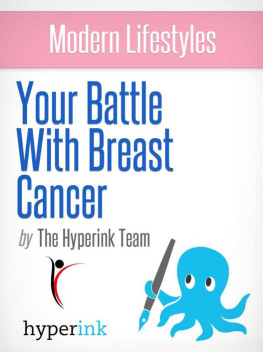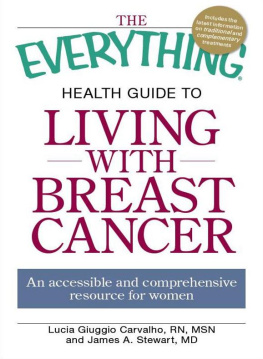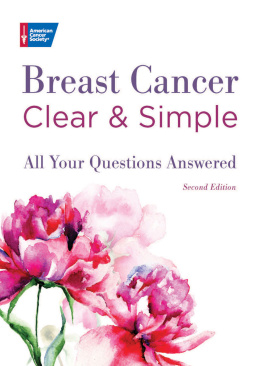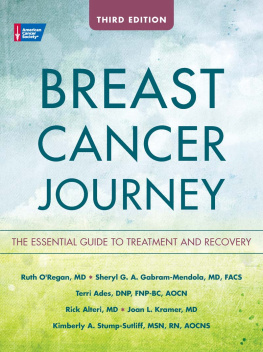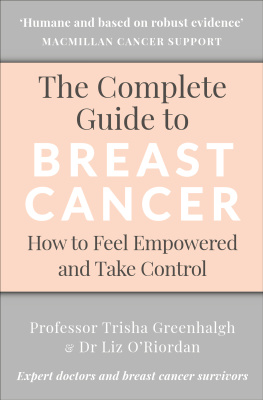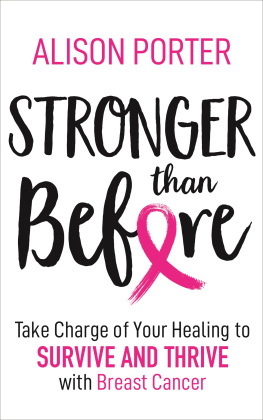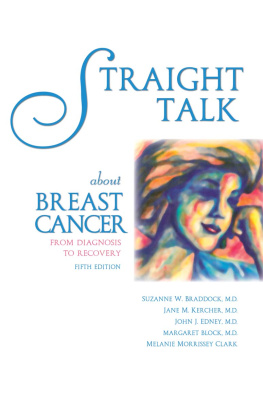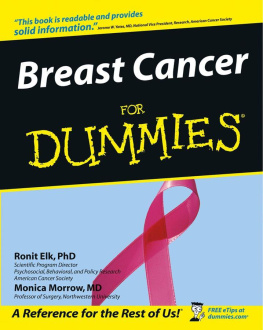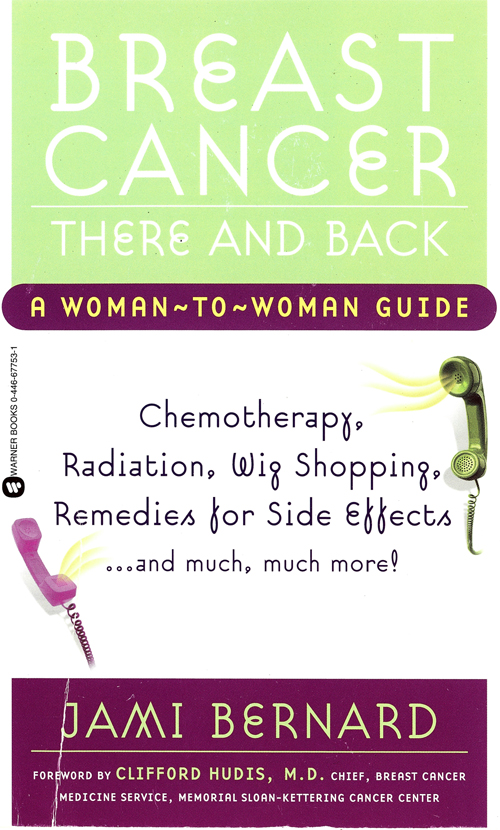Copyright 2001 by Jami Bernard
All rights reserved.
Warner Books, Inc.
Hachette Book Group
237 Park Avenue
New York, NY 10017
Visit our website at www.HachetteBookGroup.com
First eBook Edition: November 2009
ISBN: 978-0-446-57104-3
But, here's the thingI now look back on that year with a great deal of fondness! Weird, but true. And not an uncommon sentiment. Most of the women I know who have had breast cancer came to regard it as a challenge. We adapted, coped, and learned to fit cancer into our schedules so that it became something we could handle physically, mentally, and practically. In the process, we discovered new and wonderful things about ourselves and others. It was an Outward Bound for the soul.
Happiness and well-being are not guaranteed side effects of breast-cancer treatment. They are things you have to work at, just as you will work on minimizing the more unpleasant side effects of chemo and radiation. This book will help you do both. It is a practical guide that will take you step by step through those scary-sounding treatmentsthe chemo and radiation that often come after surgery for breast cancer. This book is designed to help you avoid or cope with the unpleasant stuff, and also to lift your spirits and help you find strength and wisdom through your experience.
from BREAST CANCER,
THERE AND BACK
This book is dedicated with gratitude to the medical team who saved my life:
Dr. Clifford Hudis, medical oncologist
Dr. Jeanne Petrek, surgeon
Dr. Beryl McCormack, radiation oncologist
Have laptop, will travel. Portions of this book were written at a succession of my friends' weekend homes. Thank you, Bruce Cohen (Water Mill), for the hammock, tech support, gourmet meals, and Billie Holliday piped into my bedroom. Thank you, Donna Dickman and Merrick Bursuk (Greenport) for the peach pie and the blizzard adventure. Thank you, Marianne Goldstein and Donald Berman (Pine Plains) for the frosty cocktails on the lawn. Thank you, Diane Stefani and Terry Peikin (Berkshires) for the various working weekends in which most of the work involved strapping the kayak to the top of the car. Thank you, Dorrie Crockett, for Thanksgiving in Vegas and all the study-hall sessions interrupted only by creativity-enhancing snacks.
Amanda and Peter Low, I know the guest cottage renovations weren't finished in time for this book. You did what you could. But don't worry. Next book.
While I was toiling away in country-house bliss, Marie Menendez was whistling to my parrot, Sensei, and later kept me on track by teaching me the zen of opening a pomegranate. JoAnne Wasserman took my hand and never let me walk alone in Cancer World, even when it hurt her to do so. The steadfastly supportive Dave Kehr took the terror out of going back to work when I wasn't sure I was up to it. A big group hug goes to the women from my support group, all of whom continue to be friends along this bumpy ride.
And there are more: My agent, Elaine Markson, makes everything possible. The thoughtful contributions and steady hand of my editor, Karen Melnyk, made this book a true collaboration. Gwen Darien and the staff of Mamm magazine gave me an opportunity to test-drive some of my wilder ideas about breast-cancer humor. And Baram (Ramy) Kim, my medical research assistant, is the bright light of the futuresmart, funny, beautiful, sweet, and still so young!
Other people who watched my back during the writing of this book were my colleague Jack Mathews, who is a pleasure to work with (and who also has the good sense to have a parrot); my sister, Diane Bernard; and my mother, Gloria Bernard. Lance Gould helped block those metaphors, and he has the bruises to prove it.
I now have dual citizenship here and in Cancer World, and I thank the many people I've met in both places who have eased my travels.
This book is not intended to be a substitute for medical care and advice. You are advised to consult with your health care professional about matters relating to your health, including particular matters relating to the diagnosis and treatment of breast cancer.
The information provided in this book is based upon sources that the author believes to be reliable. All such information regarding specific products and companies is current as of January 2001.
By CLIFFORD HUDIS, M.D.
Chief, Breast Cancer Medicine Service, Memorial Sloan-Kettering Cancer Center
A diagnosis of breast cancer is always scary. Some handle the news with aplomb. Others break down and hear nothing else for weeks or longer. Some interpret the diagnosis as a mountain to conquer, a busy street to cross, or a distraction from the real business of life.
Regardless, the flood of information available to the public and the heightened awareness of women's health issues in the past few decades has not necessarily made such a diagnosis any easier or less scary. All of us, plumbers and painters, teachers and even doctors, can experience the same overwhelming emotions and turmoil on first hearing that we, or someone we love, has cancer, and our first instinct may be to try and take control.
Yet this is inherently an uncontrollable situation. There's the basic deranged biology of the cancer cell, there are busy doctors and impersonal health care delivery systems, and there's the rest of your life to manage. All these things appear to be at odds with each other. This seeming loss of control and fear of future uncertainties can be overwhelming, no matter how educated and prepared you think you are.
Where do you turn? To the well-meaning friend? The comforting relative? The dispassionate doctor? Your friend's spouse, the internist? Added to this is the press of time. You have to do something about this cancer diagnosis tonight! Or so it seems. How do you gather the resources needed to begin and complete this journey in a timely but accurate manner?
These questions lead many people to different answers, but it always boils down to a quest for the right kind of information at the right time, delivered in a useful form. There is no one way to best accomplish this. For some, it's an exhaustive search of the National Library of Medicine and discussions with experts and mavens around the world. For others it's a conversation with a trusted and skilled physician, and that's all it takes. For many people, their information needs to change and grow over the days and weeks after they first learn that they may have breast cancer. Worries about finding time to schedule surgery are replaced by worries about survival and then by worries about appearance or sexuality or exercise tolerance. No matter how things unfold, there are always worries to deal with and plans to make along the way.
The question is, how does each individual approach these problems and get the needed information? In fact, it is this step that does the most to restore control. The best possible treatment allows you the best chance to control the cancer. The best possible support, be it medical or social or psychiatric, allows you to take back some control of your life.
There are numerous resources now available for a woman diagnosed with cancer, and the world is better for it. You can join a chat room on the Web or visit numerous Web sites. You can call an 800 number and talk to a volunteer, or you can talk to one or many doctors and nurses and other health care professionals. You can read a textbook or a guidebook. But in the quiet of the evening, when you just want to sit, think, and absorb at your own pace, where can you turn?


